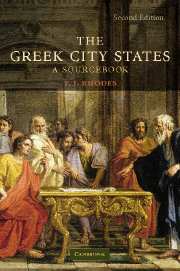Book contents
- Frontmatter
- Contents
- List of Maps
- Preface to the First Edition
- Preface to the Second Edition
- Map 1 The Greek World
- Map 2 Attica
- Introduction
- 1 The Homeric State
- 2 The Archaic State
- 3 Economic and Political Development; Tyranny and After
- 4 Sparta
- 5 Athens
- 6 Women and Children
- 7 Economic Life
- 8 Religion
- 9 Other Cities
- 10 Beyond the Single City
- 11 The Hellenistic and Roman Periods
- Bibliography
- Index of Texts
- Index of Names and Subjects
4 - Sparta
Published online by Cambridge University Press: 05 June 2012
- Frontmatter
- Contents
- List of Maps
- Preface to the First Edition
- Preface to the Second Edition
- Map 1 The Greek World
- Map 2 Attica
- Introduction
- 1 The Homeric State
- 2 The Archaic State
- 3 Economic and Political Development; Tyranny and After
- 4 Sparta
- 5 Athens
- 6 Women and Children
- 7 Economic Life
- 8 Religion
- 9 Other Cities
- 10 Beyond the Single City
- 11 The Hellenistic and Roman Periods
- Bibliography
- Index of Texts
- Index of Names and Subjects
Summary
Sparta and Athens were the largest and, in the classical period, the most powerful of the Greek city states; and they are the states about which we have most information, in the case of Athens because of the extensive publication of state documents and lawcourt speeches, in that of Sparta, because of the fascination which the Spartans exercised over the other Greeks. Documents in Sparta were rare, Thucydides in trying to give an account of the Spartan army complained of ‘the secrecy of the state’ (passage 146) and individual Spartans were not much given to writing (cf. passage 95); but until her defeat by Boeotia at Leuctra in 371 Sparta appeared to be a successful state, and her success and discipline were admired by intellectuals who found it easier to teach and write elsewhere.
In the course of the fifth century Sparta came to be regarded as the model of oligarchy and Athens as the model of democracy, but Sparta's was an oligarchy of a peculiar kind. The Spartiates, the full citizens who were members of the assembly and had some say in the running of the state, were a small minority in a population which also included perioikoi, free men with the power to run their own communities but in greater matters subject to the Spartiates, and helots, men reduced to a state of servitude.
- Type
- Chapter
- Information
- The Greek City StatesA Source Book, pp. 58 - 100Publisher: Cambridge University PressPrint publication year: 2007



